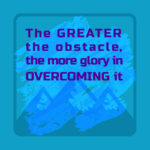Buddhism is the practice and philosophy for transforming all of our lives, providing the path to becoming absolutely happy. Because of this it deals with the impulses which can either assist or hinder our attainment of unshakeable happiness. Both the impulses which assist, arising from fundamental enlightenment, and the forces which impede our progress, originating in fundamental darkness, exist in an eternal tension in our lives.
In the post titled The Ten Troops, we discussed ten hindrances to Buddhist practice which come from inside our own lives. These can hinder our efforts to awaken our inherent Buddha nature. These included greed, care and worry, hunger and thirst, love of pleasure, fear, doubts and regret, drowsiness and languor, anger, preoccupation with wealth and fame, and arrogance and contempt for others.
Today we are going to discuss hindrances to Buddhist practice which come from outside ourselves. These kinds of hindrances can come from family members, or other significant people close to us, who oppose our practice. Some of these can be very difficult tests. Let me give you some examples.
Family Tests
Alicia and Tom’s Experience –
Alicia and Tom were married. They had practiced separately and together for 45 years and were strong practitioners. Then one day Tom started questioning everything about the practice and became more and more negative about it. He had reverted to the substance abuse of his youth.
Her must trusted relationship, her husband, had turned against the very foundation of their marriage. Initially she began to be swayed by him. But then realizing what was happening, Alicia geared in and chanted an increasing number of hours a day. Tom was not only trying to pull her away from her practice, but was threatening her income as well.
Recognizing the threat, she determined not to allow him succeed on either front. She resolved to remain firm in her practice and to stabilize her income. Ultimately they divorced. After the separation he took her to court, where he lost. Then one day, for no apparent reason, he stopped threatening her income and started paying her double what he owed her. It was a stunning reversal.
The Ikegami Brother’s Experience
Their father, who opposed their practice, threatened to disinherit the oldest boy if he didn’t give up his belief in the Daishonin’s Buddhism and tempted the younger to trade his beliefs to claim his brother’s inheritance. This happened to the Ikegami brothers but could happen today just as easily. Instead of being divided, the brothers and their wives united. The father who had tried to divide them ended up becoming a practitioner.
Standing up to Secular Pressure
Shijo Kingo’s Experience –
Shijo Kingo, one of Nichiren Daishonin’s disciples, tried to convert his lord, Ema, to the Daishonin’s teachings. Lord Ema did not respond in a positive manner. On the contrary he reduced the size of Kingo’s landholdings and threatened to send him away. His colleagues said terrible things about him and he was accused of formenting trouble. Losing his holdings could be very serious in feudal Japan. Everything was based on one’s place in society.
The Daishonin instructed Kingo on the best course of behavior under the circumstances.. Nichiren told Kingo that when the Buddha nature manifests itself from within, it will receive protection from without. How do we do that? By chanting with determination.
Nichiren also instructed Kingo in the way to behave. Don’t give in to temper, stay calm, observe what develops, don’t lament about how hard it is, respect and have concern for other people, and don’t give unreserved expression to what you are thinking. Your behavior is most important.
Later that year Lord Ema fell ill and Kingo, using his medical skills, cured him. Ema was most grateful. He not only restored but also increased Kingo’s landholdings.
Toda and Makaguichi’s Experience –
These kinds of hindrances don’t exist just in Nichiren’s time. They exist today. The first two presidents of the SGI, Toda and Makaguichi had to stand firm against the Japanese military government during World War Two. They were pressured to do something against their faith and were sent to prison for refusing to do it. That could happen anywhere, particularly if religious prejudice is condoned in a society.
Tests from Religious Authority
President Ikeda
President Ikeda confronted the Nichiren Shoshu priesthood about their corruption of the teachings of Nichiren. After he did this, the head priest made him step down from his leadership role and then excommunicated the entire SGI. Through the solid practice of both President Ikeda and the rest of the practitioners, this test resulted in the teachings of Nichiren being spread to the whole world rather than being confined to a small group in Japan.
Tests through Strong Negative Karma
Strong negative karma can threaten to disrupt one’s practice, particularly when it takes a long time, many years, to resolve an issue. Such challenges should be viewed as an opportunity to purge oneself of bad karma from the past.
Handling these Tests
Any of these tests can be very challenging. As you can see from the examples these tests tend to threaten the very thing that is most important to the practitioner. Coming to understand what is actually happening may be quite confusing, but one thing will be clear. There is a hindrance to, or something pulling you away from, your practice. The real challenge is recognizing these external hindrances for what they are.
To Handle These Tests:
1. Identify the hindrance to your practice.
2. Gear in and chant with determination to overcome it.
3. Strengthen your faith, through study, getting guidance, hearing experiences.
4. Get support – chant with other people.
5. Be strong in your practice. Hang in there. You can transform these negative external sources into positive ones through your Buddhist practice, turning poison into medicine.

